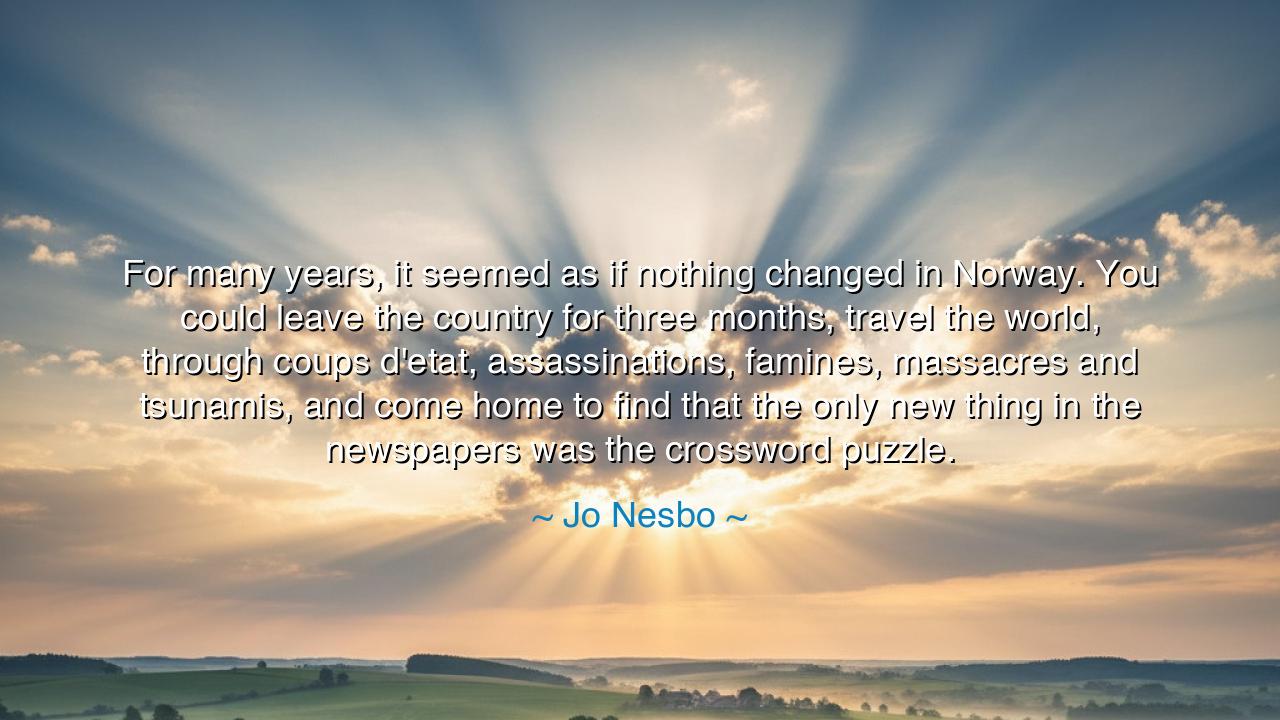
For many years, it seemed as if nothing changed in Norway. You
For many years, it seemed as if nothing changed in Norway. You could leave the country for three months, travel the world, through coups d'etat, assassinations, famines, massacres and tsunamis, and come home to find that the only new thing in the newspapers was the crossword puzzle.






Hearken, O seeker of wisdom, to the words of Jo Nesbø, who once declared: “For many years, it seemed as if nothing changed in Norway. You could leave the country for three months, travel the world, through coups d'état, assassinations, famines, massacres and tsunamis, and come home to find that the only new thing in the newspapers was the crossword puzzle.” These words carry within them not merely observation, but a reflection on the stillness of nations, the quiet of stability, and the contrast between a turbulent world and the serenity of one’s homeland. To grasp their meaning is to perceive the rhythm of history, how some lands are ravaged by storms while others dwell in seasons of long repose.
In this saying, the unchanging face of Norway is painted as a paradox. For while the wider earth shook with upheavals—kings falling, cities burning, seas rising—Norway remained a haven where time moved gently, like a stream beneath ice. The crossword puzzle, humble and trivial, becomes a symbol of this steadiness, for when all else is shifting in violence, the smallest thing may become the only new arrival. This is not mockery, but revelation: that peace, when stretched over years, can seem to the restless spirit almost like stillness unto stagnation.
Think, children of tomorrow, upon the history of Rome in the age of Augustus. When civil wars had torn the Republic into bleeding fragments, Augustus forged the Pax Romana, two centuries of relative peace. To the restless warrior, it seemed dull; to the farmer and scholar, it was salvation. So it was, too, in Nesbø’s Norway: while the rest of the world reeled with assassinations and massacres, Norwegians returned to familiar streets, to neighbors unchanged, to the same crossword waiting in their daily paper. What seemed monotony to some was in truth the rarest jewel: stability.
Yet beware, for there lies a hidden teaching: that those who dwell long in safety may forget the fragility of their blessing. When calamity does at last arrive—as it did for Norway in the 2011 Utøya tragedy—it strikes like thunder upon a people unaccustomed to war’s thunderclaps. The quote therefore speaks not only of comfort but also of danger. The world is never still forever, and a nation lulled by peace may one day awaken to grief.
But let us not despise peace for fear of its end. Consider the tale of Switzerland during the World Wars. While neighbors burned, she stood among the mountains, spared from much of the chaos. Generations grew, worked, and dreamed in comparative calm. Was this not a gift? Though some mocked her for “doing nothing,” her children slept without bombs above their roofs, and her cities endured where others were ash. Thus, peace—even quiet, uneventful peace—is no shame, but a treasure too often undervalued.
The deeper meaning, then, is this: The unchanging land is a reminder of what most of humankind yearns for but seldom attains. When the world beyond our borders is torn by famine and tsunami, by sudden death and violent upheaval, there is wisdom in cherishing the silent, ordinary days. The crossword puzzle, in its simplicity, is not banality—it is the emblem of a society spared from terror, the sign that life continues in its quiet cycles.
The lesson to be drawn is clear. Value peace even when it feels ordinary. Do not despise routine, nor mock the uneventful day, for such days are blessings woven into the fabric of life. Learn to be grateful for the stability that allows your heart to rest, your mind to create, and your children to grow in safety. For while drama is fleeting, stability builds civilizations.
Therefore, O listener, take this into your own life: seek not always the storm of change, but also the calm of constancy. Each morning, pause to honor the quiet moments—the warm meal, the steady roof, the familiar walk. Give thanks for the crossword puzzles of your own life, those small signs that your world is still intact. And when chaos rages elsewhere, do not grow callous, but let your peace give birth to compassion, that you may aid those who have not been spared. In this way, you will carry forward the wisdom of Nesbø’s words, turning ordinary peace into extraordinary gratitude.






AAdministratorAdministrator
Welcome, honored guests. Please leave a comment, we will respond soon